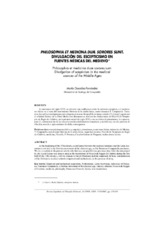Philosophia et medicina duæ sorores sunt. Divulgación del escepticismo en fuentes médicas del Medioevo
Philosophia et medicina duæ sorores sunt. Divulgation of Scepticism in the Medical Sources of the Middle Ages
Autor
González Fernández, Martín
Editor
UCOPressFecha
2009Materia
Escepticismo metódico y empíricoPirronismo
Averroísmo latino
Aristocles de Mesina,
T. Campanella
Movimiento libertino de la edad clásica
Impiedad
Ateísmo
Niccolò de Deoprepio da Regiode Calabria
Medicina
Filosofía
F. Petrarca
Claudio Galeno de Pérgamo
Traducciones latinas
Empirical and methodical scepticism
Empirical and methodical scepticism
Latin Averroism
Aristocles of Messe-ne
Libertine movement of the classical age
Impiety
Atheism
Medicine
Philosophy
Galen
Latin translations.
METS:
Mostrar el registro METSPREMIS:
Mostrar el registro PREMISMetadatos
Mostrar el registro completo del ítemResumen
A comienzos del siglo XVII, se advierte una confluencia entre la corriente escéptica y el averroísmo latino en el seno del movimiento libertino de la edad clásica, como denuncia T. Campanella. Tratamos de explicar en el presente artículo porqué esto no fue posible en época anterior. Y el papel jugado por el «Galeno latino» de la Edad Media (nos detenemos a analizar las traducciones de Niccolò de Deopre-pio da Regio de Calabria, en la primera mitad del siglo XIV), con su crítica al pirronismo y la supuesta ,para él, contaminación de las escuelas médicas helenísticas (empíricas y metódicas), en este proceso de dilación, retardo o aplazamiento de dicha convergencia. At the beginning of the 17th century, a confluence between the sceptical tendency and the Latin Ave-rroism is advised in the libertine movement of the classical age, so like Tommaso Campanella proclames.We try to explain in the present article why this was not possible in a previous time. Like the role playedby the «Latin Galen» (we drop to analyze the translations of Niccolò da Reggio di Calabria during the firsthalf of the 14th century), with its censure to the pyrrhonisme and the supposed, for him, contaminationof the Hellenistic medical schools (empirical and methodical), in this process of delay.

